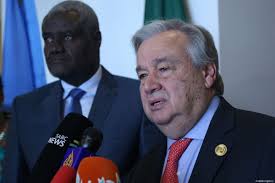APA-Addis Ababa (Ethiopia) UN Secretary-General António Guterres and AU Commission Chairperson Moussa Faki Mahamat have signed a framework agreement on human rights, which follows a previous accord on peace and security, and another on development.
In a statement the UN issued on Wednesday, the two officials, after the agreement, underscored the need to reform the global financial architecture to reflect current realities.
“What Africa needs above all is justice in international relations because Africa has been the victim of the structural injustices of our international relations,” said Guterres.
The UN chief underscored that Africa remains a key UN priority, highlighting the importance of working with the AU “based on the principle of African-led solutions for African problems”.
He said the continent has been “the double victim of injustice” linked to colonialism and slavery in the past and financial and economic power relations today.
Faki said that Africa is going through a “difficult period” as it has become “a haven for terrorism and extremism,” affecting many regions and as some AU peacekeeping operations are drawing down.
Africa is also facing economic challenges brought on by what he called the “triple crisis” of the COVID-19 pandemic, climate change and the consequences of the war in Ukraine, which has impacted food supply.
He stressed that financing for both development and peace is critical, together with reform of global financial institutions.
Faki said the two leaders will attend the COP28 climate conference that opens this week in Dubai, United Arab Emirates (UAE) which must also be the opportunity to advocate for Africa “which is severely impacted by the effects of climate change even though it pollutes very little.”
The transition to green energy must be fair, he said, given that some 600 million people across the continent still do not have access to electricity.
“We also need to ensure that we are on the right track for development. And this will perhaps help us to mitigate the issue of migration which has become a particularly delicate issue for our neighbors in Europe,” he added.
Africa had some of the highest economic growth rates in the world prior to the pandemic, which exposed injustices, including through the distribution of vaccines and in increased debt burdens that restrict fiscal space.
As a result, countries cannot respond to the basic needs of their populations, which are mainly made up of youth, leading to enormous frustration which sows the seeds for instability, coups and other developments that undermine peace and security.
MG/as/APA


